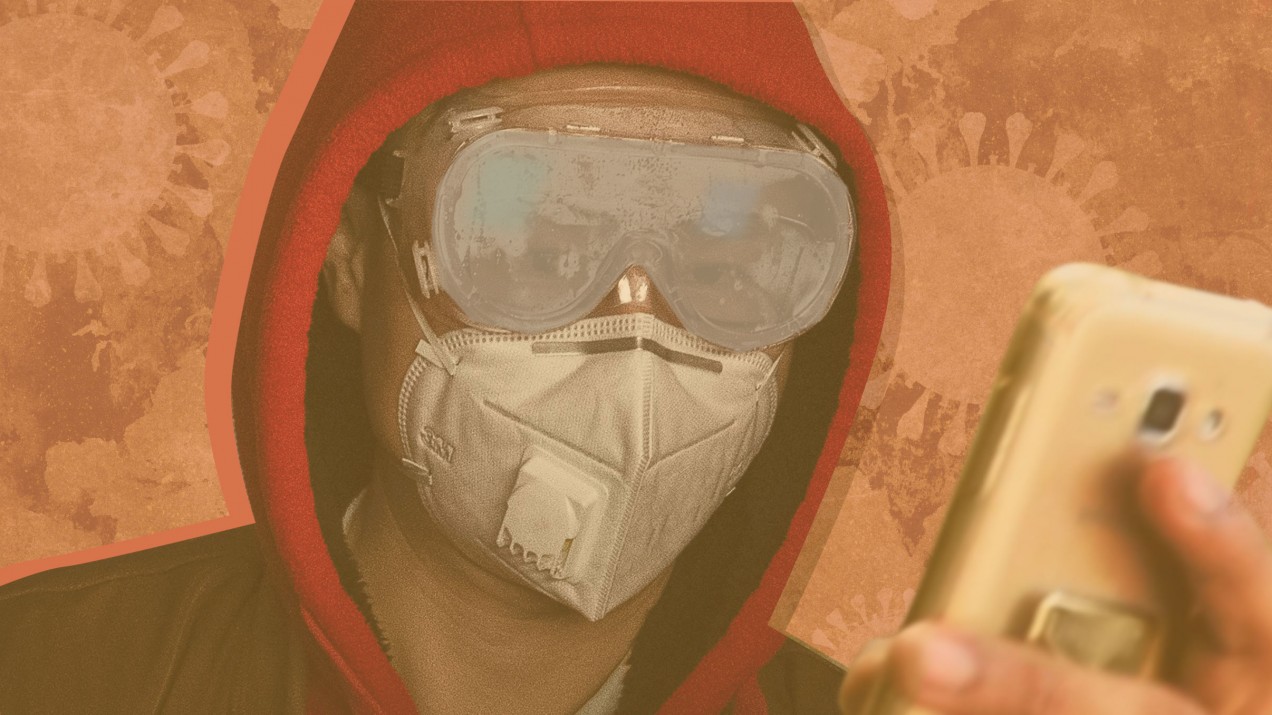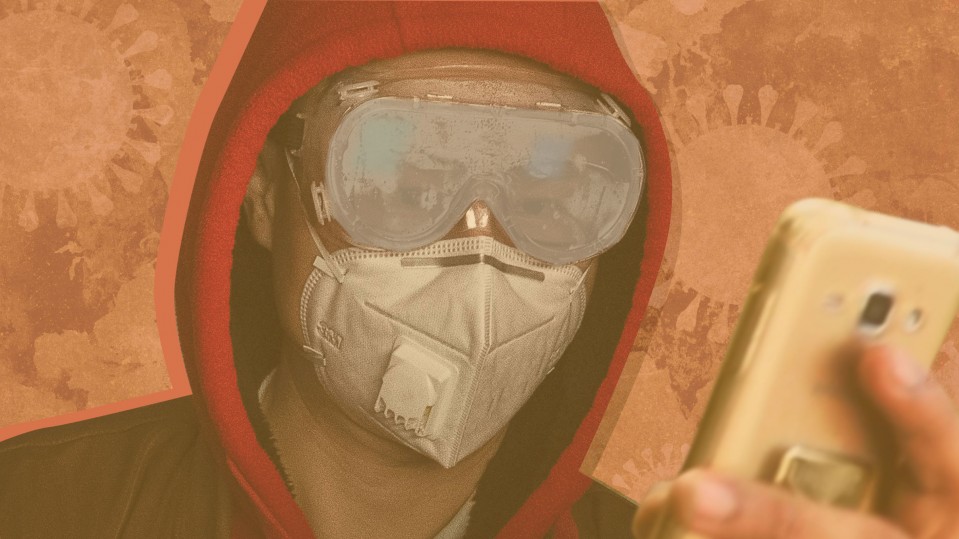

Tech Policy / Tech and Health
Meet the Chinese crowdsourcers fighting coronavirus censorship
Faced with information suppression and untrustworthy news, citizens in China and Hong Kong do their best to chronicle the coronavirus outbreak and sift fact from fiction.

When Linda logged in to the Chinese social network Weibo on Monday, she saw a curious post from the state-controlled publication People’s Daily: Hubei province was adding 100,000 beds in hopes of handling the new coronavirus that has caused panic across the country. The number was jarring given official reports that only a few thousand people were infected, and people immediately began to respond with concern. The People’s Daily account quickly deleted the post and associated hashtag.
Linda took a screenshot and saved it. (She asked that we use a pseudonym because she fears retaliation from the Chinese authorities. We verified her identity by asking her to send information from the accounts she uses to post her work.) Today Linda lives in northern China, but she’s a native of Wuhan, the capital of Hubei and the epicenter of the outbreak. She’d been in the city for the Lunar New Year holiday, but left to return home on January 22. Earlier in January she’d started collecting information about the virus to share with her family; back then they were “very relaxed” about the situation.
But after concern grew worldwide, she decided to spend time collecting, translating, and archiving information as a form of public service. The Chinese government is famously willing to censor its citizens; already, it has deleted many posts criticizing the government for its handling of the outbreak, as well as stories of people affected by the virus. “I feared that [these accounts] would disappear,” Linda says, “and that people’s experiences won’t be reported. I just want to keep an emotional archive of some sort for people asking for help and affected by it, mostly patients and medical workers.” Not everything in the archive will be accurate, and she is aware of that risk, but not everything posted from government channels has been accurate either.
Linda spends a few hours a day systematically collecting both official releases and personal accounts about the virus from social media like Weibo, WeChat, and Douban. She then translates or subtitles them into English and posts on Imgur, Reddit, Twitter, and YouTube. Though Linda says she’s “quite an unqualified social-media specialist,” some of her translations have received over 100,000 views.
Since the first cases were reported in Wuhan at the end of December, the virus has infected nearly 12,000 people, killing over 200, and has spread to at least 20 countries. In an unprecedented move, people living in Wuhan, a city of 11 million, and surrounding cities have been quarantined. The quarantine affects more than 50 million people in all.
Verifying information in a rapidly changing situation is always a struggle, but it’s especially concerning in a country where there is no free press and citizens are suspicious about whether officials will tell the truth. “There is a clear reason why people don’t trust the government,” says Yaqiu Wang, a China researcher at Human Rights Watch. Plenty of people remember the lack of transparency during the 2003 SARS outbreak. During the 2008 earthquake in Sichuan, people trying to expose the truth were imprisoned, Wang adds, and “at the beginning of [this] January, people trying to tell the story [of the virus] were summoned by the police for rumor-mongering.”
Recently, Chinese state media spread a false picture of the hospital supposedly being built in Wuhan. There are plenty of hoaxes going around that the government is trying to quash, but also credible fears that the situation is worse than the authorities are reporting. In this situation, the line between paranoia and justified distrust can be razor thin. As frightening rumors and images spread across the world, citizens in mainland China and Hong Kong are taking the initiative.
Tiny news networks on social apps
While Linda is concerned with creating a chronicle of testimonies that might be deleted, others are operating mini-newsrooms using closed chat groups. Andy Tang, a 17-year-old in Hong Kong, runs a WhatsApp group called GloNews Room (as in “global news room”). Closed messaging apps like WeChat, WhatsApp, and Telegram have become increasingly popular ways of keeping up with the news given distrust of official sources. The curated nature, and the fact that it seems like a private communication app for friends, makes people feel that it’s a more trustworthy medium, Tang says. He likes WhatsApp because the members can receive instant notifications of his news updates.
Friends began adding other friends, especially during the Hong Kong protests earlier this year, and GloNews Room’s membership has now grown to about 80 people. Tang, who has been covering the virus since late December, spends a couple of hours a day scouring the headlines. He will either write digests or directly share links, sometimes adding graphs of his own. Some of the work involves debunking rumors by checking them against other sources, such as a video of people eating bats that was actually made a few years ago and not connected to the current outbreak, he says.
Two members of GloNews Room, Hong Kong teens Ken Chung and Ronald Lam, decided to create a more public version of the updates: a live map of the virus, along with headlines from major news sources. Most similar maps were created by Chinese media, says Chung, and there weren’t many that were in English or in the traditional Chinese used in Hong Kong and Taiwan. So he, Lam, and another friend produce their map in both languages, and try to update about every 15 minutes. In less than a week, the site has gathered one million unique visitors and 10 million views, with people visiting from Asia (especially Southeast Asia), North America, and Europe.
Real or not real?
Everyone trying to understand information about the coronavirus must grapple with the lack of transparency. Linda says that she needs to balance her mistrust of government reports with skepticism about the posts she sees. The moderators of one subreddit initially took down some of her postings because they were not confirmed by an “internationally acknowledged” news source. But that kind of verification can be impossible for the personal accounts she is saving, which can pass through closed groups.
Linda will verify when she can—for instance, she found some posts from an alumni group, and checked all the names to make sure the people actually exist. She’s also suspicious of the many videos of people collapsing on the ground. “I tell people to take these with a grain of salt,” she says, and she tries to be clear that many posts are unconfirmed, asking others to tell her if anything seems questionable. Still, the threat of spreading misinformation is real. So is the threat of the government taking down legitimate posts.
Tang, meanwhile, doesn’t trust official Chinese media but does trust sources like CNN, BBC, AP, and AFP. Not everybody feels the same way. The volunteer group A2N relies heavily on official news as it collects official reports and scientific information to post to Weibo. Its list of credible sources include hospital reports, People’s Daily, and the business publication Caixin. A2N’s guidelines say that they will only post true information—which they say doesn’t necessarily mean absolutely correct, just credible and traceable. (A2N did not respond to requests for comment.)
There’s clearly little consensus on what is considered trustworthy news right now, aside from independent foreign media. It’s ironic, then, that while many Westerners are worried about out-of-context messages from Asia, people in mainland China and Hong Kong are trying to fight misinformation by looking to mainstream Western sources.
For her part, Yaqiu Wang, the Human Rights Watch researcher, says the most helpful thing the Chinese government could do to inspire trust is let independent journalists do their job. That is unlikely to happen, but “when there is no independent media that can independently report, what can you do?” Wang says. “You screenshot things, you do the best you can. You have to get the information.”